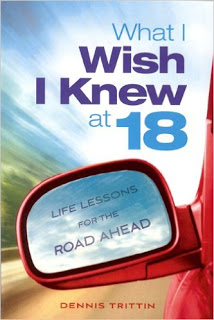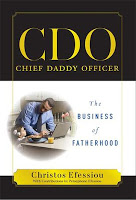Showing posts with label Parenting. Show all posts
Showing posts with label Parenting. Show all posts
Wednesday, November 18, 2015
How to Prepare High School Students for Life
Even though it’s been more than 40 years ago, I can still clearly remember the day my parents dropped me off to start my college career. I had no idea what to expect. They had brought all six of us kids up with a strong moral compass, but I know I wasn’t prepared for all the challenges and choices I’d face in that first year and throughout my college life.
I had to feel my way through the process, and I made a lot of mistakes along the way. A lot.
If only I’d had a manual…
Dennis Trittin’s book, What I Wish I Knew at 18, IS that manual. It’s the perfect book to prepare young adults for life after high school.
The idea for writing it was inspired by Dennis’ experience when it came time to send his own son off to college. He realized there were many things he wanted his son to know, and he made a detailed list, which evolved into the expanded text that became this book. You can feel his heart and hard-earned wisdom on every page.
Dennis takes a holistic approach, covering all aspects of life—developing yourself into a person of character, dedicating yourself to learning in both school and work, building strong interpersonal skills so you’re effective with everyone important to you, and investing time to the spiritual dimension.
This is the kind of book you’ll want to give as a gift to high school students and graduates alike because it’s filled with a powerful combination of principles and practical applications. There’s excellent advice on choosing a satisfying career, whether it’s right out of high school or after a two- or four-year degree.
Dennis includes specific steps and tips for college students on their own for the first time, such as developing positive study habits and preparing for tests and exams. And there’s not a job-seeker in the world who couldn’t benefit from Dennis’ advice on setting yourself apart during an interview and establishing yourself as a star employee who gets rave performance reviews. These chapters in the book are pure gold!
Dennis understands his audience, recognizing the need for short reflection activities. He’s built in “Take Five” exercises, which help readers think about how they can apply the key points at the end of each section.
And throughout, he makes the concepts both memorable and useful through personal stories. This is a book that can positively impact young people’s lives…for the rest of their lives.
And if you’re an adult who works with groups of high school students – such as a teacher or guidance counselor - check out the Study Guide for What I Wish I Knew at 18 that Dennis wrote with Arlyn Lawrence. It’s an excellent companion to the book, with exercises and supplementary material that help students internalize the lessons from the book.
Monday, July 13, 2015
Is Your Heart at Peace or at War with Others?
Do you have an ongoing conflict with someone in your professional or personal life?
If the tension and differences have been going on for a while, you’ve probably made a substantial list of things about that person you’d like to change. Maybe it’s their attitude or their approach, or certain words and actions they use. If they would just start doing X or stop doing Y, then your life would be so much happier.
What if there were something YOU could do that would dramatically improve the situation?
A profound book, The Anatomy of Peace by The Arbinger Institute, has the potential for that kind of positive impact, if you’re willing to look within, recognize your role in the conflict and change your mindset.
This statement from the book summarizes one of the core concepts:
“No conflict can be solved so long as all parties are convinced they are right. Solution is possible only when at least one party begins to consider how he might be wrong…The deepest way in which we are right or wrong is in our way of being toward others.”
Unlike many books about conflict that take a more academic, didactic approach, this one reads like an engaging novel, using fictitious characters in realistic situations to convey the key points and lessons. In this case, two facilitators at a treatment center lead a two-day workshop with parents whose teenage children have just been admitted.
Very likely, you’ll find it impossible to read this book without thinking about ways that you’ve contributed to difficult relationships you’ve had in your life - even if, up to this moment, you’ve held the firm belief that the other person was at fault.
You’ll learn about four common styles of justification—different types of “boxes” you can put yourself in when dealing with conflict. Within a given box, you have a particular set of feelings and a distinct way that you view Yourself, Others and the World.
For example, in the “Better-Than” box, you can feel impatient and disdainful as you view yourself as superior and virtuous while seeing others as inferior and irrelevant.
Each of the other boxes – I-Deserve, Need-to-Be-Seen-As, and Worse-Than – contain their own unique elements that prevent us from seeing the other as a person, where we care enough about them to want to help them succeed. Instead, we view them more as an object.
One of the facilitators relays a story about dropping some lettuce on the kitchen floor as he was making a sandwich. Instead of reaching down and picking it up, he kicked it under the counter with his toe. He later acknowledges that from his “Better-Than” box, he conveyed to his wife that he saw her “as just unimportant enough that she should be the one to have to worry about that kind of thing.”
He followed up with a question that all of us can consider when we commit our own version of this offense: “How would it be to live with someone who thought of you like that?”
Some of our behaviors are so ingrained – we are so firmly entrenched in our box – that we are blind to the impact that we have on others. The authors refer to this a having “a heart at war” where we feel the need to blame others (whether silently or verbally) while justifying our own attitudes and behaviors:
“When our hearts are at war, we tend to exaggerate others’ faults, that’s what we call horribilizing. We tend to exaggerate the differences between ourselves and those we are blaming…We also exaggerate the importance of anything that will justify us.”
The goal is to create a heart at peace, where we put a stop to violating our own sensibilities toward another person.
One of the best ways to make this shift and get outside the box is to invest time in answering a series of questions designed to help you relate differently to a specific person.
- What are this person’s challenges, burdens and pains?
- How am I adding to these?
- In what other ways have I neglected or mistreated this person?
- What could I do to HELP?
Answering these questions helps to break you free from your justifications and blame because you being to see the other as a person again.
And once you recognize what you need to do, then you have to take actions that build the relationship. It can take time to re-establish trust and respect. The effort will be worth it.
These same questions can be used to solve conflicts in larger groups – across families, communities and even nations.
If you’re interested in building the strongest relationships possible with the people who matter to you, read and apply the powerful wisdom of this book.
Sunday, July 27, 2014
Conversations Overheard on a Blueberry Farm
Every summer my husband Lee and I visit a local blueberry farm to pick spray-free berries and stock up with a year’s supply. We usually avoid going on Saturday because of the crowd. But on this particular weekend, that was the only day we could go.
Lee and I are serious berry pickers.
We don’t talk much to each other during our time in the field. Instead, we focus on finding only the best, ripest berries and filling our buckets.
But apparently, for a lot of folks, picking berries is the preferred way to socialize with family and friends.
Since we’re not talking, we easily hear the conversations of those in close proximity.
Being the observer of people I am, I can’t help but notice the differences in the types of exchanges that take place, especially between adults and the children with them.
And I once again marvel at the opportunities adults have for positive influencing (or not) the young people in their charge.
Here are some exchanges that stood out for me…and why. (Note: Ages cited for children are best guesses, not verified).
Most ENDEARING (Mother and 5-year old Daughter)
Daughter: Mommy, here are some berries I picked. You can put them in your bucket.
Mother: Why thank you, honey. That’s very kind of you to share with me.
Daughter: Of course! You’re my mommy, and I love you.
My take: Children don’t naturally become sensitive to the needs of others. It takes effort on the part of their parents to help them become less self-centered. This brief exchange, along with other comments they shared, illustrated that this mother has invested time teaching her daughter to be thoughtful and considerate.
Most ANNOYING (Grandmother with 8 year-old Girl and 10-year old Boy)
Boy: It’s getting too hot out here, Grandma. (actual temperature: low 80s)
Girl: Yeah, I’m starting to get all sweaty.
Grandmother: It’s not fun when you got hot and sweaty. Would you like to quit now?
My take: I wanted to jump through the bushes and shake this woman when I heard her reply to these two whiners. It was a beautiful, sunny day – perfect for being outdoors. Instead of encouraging the kids to enjoy their time outside or assuring them that sweat is the body’s natural response or any other comment that would have communicated they had no basis for complaining, she sympathized with them. Her response did nothing to help these children develop mental and physical toughness.
Most HUMOROUS (Man at edge of field and Grandfather in middle of field)
Man: Is there a Grandpa King out there somewhere?
Grandfather: Yes, here I am!
Man: Great, I’ve got your grandson with me. He couldn’t find you.
Grandfather: Good luck to you! (everyone in the entire field laughs in unison)
My take: Later at the barn when we were paying for our berries, we saw the grandfather with his wife and grandson. Their interactions showed that he had probably only been half-joking with his earlier response. He didn’t seem to be enjoying his time with the boy. No matter what the grandson said or did, the man had a critical comeback. While I know children can try your patience, you can always find something to praise and affirm if you’re paying attention.
As adults, we’ve established closely-held beliefs about who we are and what we’re capable of. What we heard about ourselves as children from those whose approval means most to us – such as parents and grandparents – goes a long way to shaping the way we see ourselves.
No matter what role you have in the lives of the young people you interact with, you have the power with your words to enrich or diminish their self-image and the way they view the world.
And come to think of it, you also wield that same influence with everyone you interact with, no matter what their age.
Lee and I are serious berry pickers.
We don’t talk much to each other during our time in the field. Instead, we focus on finding only the best, ripest berries and filling our buckets.
But apparently, for a lot of folks, picking berries is the preferred way to socialize with family and friends.
Since we’re not talking, we easily hear the conversations of those in close proximity.
Being the observer of people I am, I can’t help but notice the differences in the types of exchanges that take place, especially between adults and the children with them.
And I once again marvel at the opportunities adults have for positive influencing (or not) the young people in their charge.
Here are some exchanges that stood out for me…and why. (Note: Ages cited for children are best guesses, not verified).
Most ENDEARING (Mother and 5-year old Daughter)
Daughter: Mommy, here are some berries I picked. You can put them in your bucket.
Mother: Why thank you, honey. That’s very kind of you to share with me.
Daughter: Of course! You’re my mommy, and I love you.
My take: Children don’t naturally become sensitive to the needs of others. It takes effort on the part of their parents to help them become less self-centered. This brief exchange, along with other comments they shared, illustrated that this mother has invested time teaching her daughter to be thoughtful and considerate.
Most ANNOYING (Grandmother with 8 year-old Girl and 10-year old Boy)
Boy: It’s getting too hot out here, Grandma. (actual temperature: low 80s)
Girl: Yeah, I’m starting to get all sweaty.
Grandmother: It’s not fun when you got hot and sweaty. Would you like to quit now?
My take: I wanted to jump through the bushes and shake this woman when I heard her reply to these two whiners. It was a beautiful, sunny day – perfect for being outdoors. Instead of encouraging the kids to enjoy their time outside or assuring them that sweat is the body’s natural response or any other comment that would have communicated they had no basis for complaining, she sympathized with them. Her response did nothing to help these children develop mental and physical toughness.
Most HUMOROUS (Man at edge of field and Grandfather in middle of field)
Man: Is there a Grandpa King out there somewhere?
Grandfather: Yes, here I am!
Man: Great, I’ve got your grandson with me. He couldn’t find you.
Grandfather: Good luck to you! (everyone in the entire field laughs in unison)
My take: Later at the barn when we were paying for our berries, we saw the grandfather with his wife and grandson. Their interactions showed that he had probably only been half-joking with his earlier response. He didn’t seem to be enjoying his time with the boy. No matter what the grandson said or did, the man had a critical comeback. While I know children can try your patience, you can always find something to praise and affirm if you’re paying attention.
As adults, we’ve established closely-held beliefs about who we are and what we’re capable of. What we heard about ourselves as children from those whose approval means most to us – such as parents and grandparents – goes a long way to shaping the way we see ourselves.
No matter what role you have in the lives of the young people you interact with, you have the power with your words to enrich or diminish their self-image and the way they view the world.
And come to think of it, you also wield that same influence with everyone you interact with, no matter what their age.
“Treat a child as though he already is the person he’s capable of becoming.”
- Haim Ginott, child psychologist, 1922-1973)
Monday, June 2, 2014
Motivating Others – What Doesn’t Work
I vividly recall a scene from 8th grade, even though it happened almost 50 years ago.
I attended a Catholic school, and many of the teachers were nuns.
On this particular day, Sister “Mary” had just walked back into the classroom. We could tell she was angry but no one could guess why. She marched up to a student whose desk was in the front row, and she commanded him to stand.
When he did, she slapped his face and sternly said, “Your desk is out of line!”
His face turned bright red, most likely from embarrassment and the sting from the slap. He straightened his desk and sheepishly slithered back into his seat.
This was not the first or only occasion that Sister Mary delivered a slap to a male student that year.
While the girls were spared such physical abuse, they did endure degrading verbal attacks.
Sister Mary controlled the students in her classroom using fear and humiliation.
That approach worked if you measured results by compliance.
We were scared into a level of obedience that squelched any spark of individuality or creativity.
I’m sure Sister Mary thought she was teaching us valuable lessons. But in fact, she created an environment where students silently resented her actions and couldn’t wait to get away from her.
She had no clue about what it takes to motivate young people to give their best effort.
Unfortunately, some adults today continue to use such tactics to intimidate people at work, at home or at school. In their roles as boss, parent or teacher, they require strict observance of their rules. When those rules are not followed, there’s hell to pay.
There’s no attempt to understand the needs or wants of others. No interest in having a reasonable conversation to discuss alternative points of view.
And so, those affected by the person in authority can end up feeling threatened, humiliated or afraid. They might conform to the requirements, but they are repelled by the leader’s behavior.
They’re likely to become angry and resentful about the treatment they’re receiving. They may be outraged at the unfairness they’re experiencing personally or observing happen to others.
If you’re in a position to influence others, take a close look at your own approach.
As a parent, how do you respond when your children ask questions that challenge one of your rules? How often do you invite them to tell you the reasons behind requests they make so you can truly understand their perspective?
As a leader, what do you say or do to communicate to others that you value their ideas and contributions? That you appreciate who they are?
On a daily basis, examine ways that you may intimidate the important people in your life. Look closely at what you do or don't do to encourage and support them.
If you’re not sure how they perceive you, just ask what they’d like you to do more of and what they’d like you to do less of. You’ll discover what would truly motivate them to give their best.
I attended a Catholic school, and many of the teachers were nuns.
On this particular day, Sister “Mary” had just walked back into the classroom. We could tell she was angry but no one could guess why. She marched up to a student whose desk was in the front row, and she commanded him to stand.
When he did, she slapped his face and sternly said, “Your desk is out of line!”
His face turned bright red, most likely from embarrassment and the sting from the slap. He straightened his desk and sheepishly slithered back into his seat.
This was not the first or only occasion that Sister Mary delivered a slap to a male student that year.
While the girls were spared such physical abuse, they did endure degrading verbal attacks.
Sister Mary controlled the students in her classroom using fear and humiliation.
That approach worked if you measured results by compliance.
We were scared into a level of obedience that squelched any spark of individuality or creativity.
I’m sure Sister Mary thought she was teaching us valuable lessons. But in fact, she created an environment where students silently resented her actions and couldn’t wait to get away from her.
She had no clue about what it takes to motivate young people to give their best effort.
Unfortunately, some adults today continue to use such tactics to intimidate people at work, at home or at school. In their roles as boss, parent or teacher, they require strict observance of their rules. When those rules are not followed, there’s hell to pay.
There’s no attempt to understand the needs or wants of others. No interest in having a reasonable conversation to discuss alternative points of view.
And so, those affected by the person in authority can end up feeling threatened, humiliated or afraid. They might conform to the requirements, but they are repelled by the leader’s behavior.
They’re likely to become angry and resentful about the treatment they’re receiving. They may be outraged at the unfairness they’re experiencing personally or observing happen to others.
If you’re in a position to influence others, take a close look at your own approach.
As a parent, how do you respond when your children ask questions that challenge one of your rules? How often do you invite them to tell you the reasons behind requests they make so you can truly understand their perspective?
As a leader, what do you say or do to communicate to others that you value their ideas and contributions? That you appreciate who they are?
On a daily basis, examine ways that you may intimidate the important people in your life. Look closely at what you do or don't do to encourage and support them.
If you’re not sure how they perceive you, just ask what they’d like you to do more of and what they’d like you to do less of. You’ll discover what would truly motivate them to give their best.
Monday, March 31, 2014
Listening with Your EYES
For more than 25 years, I've been teaching people how to become better listeners.
During that entire time, I've emphasized the need to really understand what another person is trying to tell you. That involves paying attention to the words, tone of voice and body language.
But I realized another way to think and talk about this process recently, when I was being interviewed by Chris Efessiou on his radio show Straight Up with Chris.
Our EARS are not the only sensory organs that we need to engage to be effective listeners.
If we’re going to “get” a person’s complete message, we also need to use our EYES.
Chris and I were discussing why listening is the foundation for all other communication skills, and why it’s not just about hearing someone speak.
He teaches negotiations at two universities and emphasizes this point with students:
I've known for decades the truth of these words, but I hadn't thought about it in terms of using your eyes even more than your ears.
Ignoring what you see when communicating with others can cause you to miss a huge part of the message, often the most important part.
Suppose you’re talking with your teenage daughter. You’re telling her something and she says “Yes” to every point you make. Yet her posture clearly shows that she is not buying what you’re trying to sell her. If you’re not observing that part of her reaction, you’ll miss what she’s really conveying.
Or at work, you've made a difficult decision and announced it to another person who will be impacted by it. You ask if he’s OK with it and you get the response, “It’s fine.” But his body slumps in the chair, and disappointment is written on his face. Are you paying attention to his body language, in addition to his words?
Communication is hard. We don’t learn these essential skills in school, and often we focus on the wrong things – what we want to say, the strength of our position or rationale, attempting to persuade the other person to accept our point of view…
If we can take more time to zero in on others – to truly see who they are and how they’re reacting to our message – we’re much more likely to interpret their response accurately.
This dynamic gives us the opportunity to have real dialogue and go deeper. We can address the discrepancy between their words and their body language, and open the door for them to be honest with us about their real thoughts and feelings.
If you’re genuinely interested in “getting” another person, commit to using your ears and your eyes in every conversation. You may be astounded at what you learn…and what you've been missing.
And if you'd like to learn about other four communication skills I discussed with Chris Efessiou on his show, listen to the full interview.
During that entire time, I've emphasized the need to really understand what another person is trying to tell you. That involves paying attention to the words, tone of voice and body language.
But I realized another way to think and talk about this process recently, when I was being interviewed by Chris Efessiou on his radio show Straight Up with Chris.
Our EARS are not the only sensory organs that we need to engage to be effective listeners.
If we’re going to “get” a person’s complete message, we also need to use our EYES.
Chris and I were discussing why listening is the foundation for all other communication skills, and why it’s not just about hearing someone speak.
He teaches negotiations at two universities and emphasizes this point with students:
With the art and science of negotiating,
80% of it is LISTENING and OBSERVING.
I've known for decades the truth of these words, but I hadn't thought about it in terms of using your eyes even more than your ears.
Ignoring what you see when communicating with others can cause you to miss a huge part of the message, often the most important part.
Suppose you’re talking with your teenage daughter. You’re telling her something and she says “Yes” to every point you make. Yet her posture clearly shows that she is not buying what you’re trying to sell her. If you’re not observing that part of her reaction, you’ll miss what she’s really conveying.
Or at work, you've made a difficult decision and announced it to another person who will be impacted by it. You ask if he’s OK with it and you get the response, “It’s fine.” But his body slumps in the chair, and disappointment is written on his face. Are you paying attention to his body language, in addition to his words?
Communication is hard. We don’t learn these essential skills in school, and often we focus on the wrong things – what we want to say, the strength of our position or rationale, attempting to persuade the other person to accept our point of view…
If we can take more time to zero in on others – to truly see who they are and how they’re reacting to our message – we’re much more likely to interpret their response accurately.
This dynamic gives us the opportunity to have real dialogue and go deeper. We can address the discrepancy between their words and their body language, and open the door for them to be honest with us about their real thoughts and feelings.
If you’re genuinely interested in “getting” another person, commit to using your ears and your eyes in every conversation. You may be astounded at what you learn…and what you've been missing.
And if you'd like to learn about other four communication skills I discussed with Chris Efessiou on his show, listen to the full interview.
Tuesday, March 11, 2014
Help Your Children Learn How to Manage Money
The habits that parents help their children establish while growing up carry over into adult life. Take money, for example.
Kids who are given whatever they ask for don’t appreciate what it takes to work for something you really want. They can easily develop an “entitlement” mindset with adverse consequences later.
Imagine the difference if instead, they learn that when you want something, you have to put forth effort to make it a reality. It doesn’t magically appear out of thin air.
When our daughter Alison turned 13, we decided to give her a clothing allowance. Each month she knew she would receive a set amount of money that she could spend on clothes. And by the way, it wasn’t a generous amount.
She could blow it all on a single blouse or pair of shoes, or she could take advantage of sales, discount coupons and consignment shops to stretch her dollars.
She also understood that she couldn't come back to her dad and me to make up the difference if there were a big-ticket item she wanted to purchase. No, she had to find a way to earn the money. Or she had to save up the allowance over a number of months.
She quickly learned it was fruitless to ask us for more. We’d simply require her to figure out for herself how she was going to buy something she claimed to desperately want.
Yes, at times she complained. Her other friends didn't have these kinds of restrictions, their parents were more lenient, etc. But this occasional whining didn't faze us. We firmly believed that learning how money works in the real world was a critical life skill we needed to teach her.
During her junior year in high school, the French teacher decided to set up a trip to France for the students. Alison was beside herself with excitement about the prospect of visiting that country. When she presented us with the total price for the trip, we agreed that she could go if she paid for half the expenses.
After an initial protest, she started figuring out ways to earn the money. And she did. I’m convinced she enjoyed the trip all the more because she had to invest her own money in the adventure.
It’s been a decade since Alison was a teenager, and these thrifty habits have continued into her adult life.
She and her husband love to travel, and Alison approaches each trip as a personal challenge to combine economy with luxury.
Recently they went to New York City, stayed at the Waldorf Astoria and enjoyed many fabulous meals. But it didn't cost them a fortune because she had applied her finely-honed sleuthing skills to uncover terrific deals online.
Whether it’s clothing, home furnishings or food, she seeks out bargains. You’ll rarely see her pay full price for anything, and she’s taught her dad and me some great tips for shopping at consignment shops and thrift stores.
Her personal money management skills influenced her career choice, too. She works in the financial investment industry, helping people make the most of their money as they plan for the future. She absolutely loves her work and feels a deep sense of satisfaction in guiding others to think about their long-term financial needs.
As parents, one of our most important jobs is to prepare our children to become independent, responsible adults. When they learn how to manage money, they acquire other strengths they’ll need for life, such as self-discipline, patience and effort.
Kids who are given whatever they ask for don’t appreciate what it takes to work for something you really want. They can easily develop an “entitlement” mindset with adverse consequences later.
Imagine the difference if instead, they learn that when you want something, you have to put forth effort to make it a reality. It doesn’t magically appear out of thin air.
When our daughter Alison turned 13, we decided to give her a clothing allowance. Each month she knew she would receive a set amount of money that she could spend on clothes. And by the way, it wasn’t a generous amount.
She could blow it all on a single blouse or pair of shoes, or she could take advantage of sales, discount coupons and consignment shops to stretch her dollars.
She also understood that she couldn't come back to her dad and me to make up the difference if there were a big-ticket item she wanted to purchase. No, she had to find a way to earn the money. Or she had to save up the allowance over a number of months.
She quickly learned it was fruitless to ask us for more. We’d simply require her to figure out for herself how she was going to buy something she claimed to desperately want.
Yes, at times she complained. Her other friends didn't have these kinds of restrictions, their parents were more lenient, etc. But this occasional whining didn't faze us. We firmly believed that learning how money works in the real world was a critical life skill we needed to teach her.
During her junior year in high school, the French teacher decided to set up a trip to France for the students. Alison was beside herself with excitement about the prospect of visiting that country. When she presented us with the total price for the trip, we agreed that she could go if she paid for half the expenses.
After an initial protest, she started figuring out ways to earn the money. And she did. I’m convinced she enjoyed the trip all the more because she had to invest her own money in the adventure.
It’s been a decade since Alison was a teenager, and these thrifty habits have continued into her adult life.
She and her husband love to travel, and Alison approaches each trip as a personal challenge to combine economy with luxury.
Recently they went to New York City, stayed at the Waldorf Astoria and enjoyed many fabulous meals. But it didn't cost them a fortune because she had applied her finely-honed sleuthing skills to uncover terrific deals online.
Whether it’s clothing, home furnishings or food, she seeks out bargains. You’ll rarely see her pay full price for anything, and she’s taught her dad and me some great tips for shopping at consignment shops and thrift stores.
Her personal money management skills influenced her career choice, too. She works in the financial investment industry, helping people make the most of their money as they plan for the future. She absolutely loves her work and feels a deep sense of satisfaction in guiding others to think about their long-term financial needs.
As parents, one of our most important jobs is to prepare our children to become independent, responsible adults. When they learn how to manage money, they acquire other strengths they’ll need for life, such as self-discipline, patience and effort.
Labels:
Manage Money,
Parenting,
Personal Stories,
Raising Children
Monday, August 26, 2013
Do You Empower or Create Dependence?
Qualifying projects include activities such as building park benches or picnic tables, constructing a playground, organizing a blood drive for the blood bank or creating a garden area at a local nursing home.
Over the years, I've known several parents – most often mothers – who have taken over these projects to make sure they get completed.
They go way beyond encouragement and support.
They come up with the idea. They make the calls. They raise money to help fund the project. They organize the volunteers. They do the lion’s share of the work. And afterwards, they assist in writing up the report and preparing the display for the Court of Honor ceremony.
Meanwhile, their sons’ involvement is marginalized.
Unfortunately, this dynamic undermines the real purpose of the project: for a young man to assume a leadership role and manage a significant project from beginning to end. And at the same time, he’s robbed of a sense of accomplishment that comes when a person makes a tangible contribution to the community.
The parent communicates one or both of these messages to the young person:
“You aren't capable of doing this on your own.”
“Don’t worry. I’ll take care of this for you.”
One of the most important jobs of a leader – whether at work or at home – is to create a strong sense of self-reliance and self-confidence in those you lead.
You help them see they are capable of doing more than they first thought, by giving opportunities to risk, stretch and grow.
But often, managers and parents unwittingly do just the opposite.
Maybe you’re reluctant to give up control because someone may not do the task as well as you could.
Or you believe you don’t have time to teach the person and it will be easier to do it yourself.
Or maybe you’re afraid of looking bad if the person makes mistakes or even fails at the project.
Empowering people to perform at their best means that you have to be clear about the goal, give them what they need, and encourage them along the way. If you can help others believe that they can do what’s required, you’ll be amazed at what they’ll achieve.
“Outstanding leaders go out of their way to boost the self-esteem of their personnel. If people believe in themselves, it’s amazing what they can accomplish.” - Sam Walton, American business leader (1918-1998)
"Leadership is lifting a person's vision to higher sights, the raising of a person's performance to a higher standard, the building of a personality beyond its normal limitations." - Peter Drucker, American author (1909- 2005)
“A mediocre person tells. A good person explains. A superior person demonstrates. A great person inspires others to see for themselves.” - Harvey Mackay, American author (1933- )
Sunday, August 4, 2013
Developing a Strong Work Ethic Takes Work
But I noticed one very interesting thing over the course of the 3 days.
A few of us consistently pitched in to help clean up the dishes after a meal, while others were content to sit around and watch.
I found it curious that the thought never seemed to cross their minds about making a contribution or doing their fair share.
We were all about the same age and from similar economic backgrounds, so it wasn't a difference in generations or finances.
I’m pretty sure I know one key reason, based on other situations I've witnessed over the years.
It’s rooted in the development of a strong work ethic in childhood.
Think back to your own childhood. What kinds of chores were you required to do when you were growing up?
In my family, I was the #2 daughter with four younger brothers. My sister and I were given regular chores from the time we were very young. As our brothers got older, they had their jobs, too. The complexity of our tasks increased as we got older, but we always understood that we were expected to do our part as members of the family.
We were encouraged to babysit and have paper routes to earn money. My parents did not hand out money to us, throw us lavish birthday parties or buy us things just because we wanted them.
Each one of us developed a strong work ethic because of the tone and expectations my parents set.
Parents need to instill in their children at a very early age the idea that they are not the center of the universe. They are part of a larger entity – the family – and everyone needs to be a contributor at whatever level is appropriate for their age.
It’s important to gradually give more responsibilities as kids get older. The idea is, by the time they reach adulthood, they are prepared to support themselves, live independently and contribute to society at large.
That means, along the way they acquire personal strengths like:
Initiative - They see what needs to be done and do it without being asked.
Effort - They’re willing to work hard, giving the best they have.
Responsibility - They “own” certain tasks or jobs – e.g., washing dishes, taking out the trash, or cleaning the bathrooms.
Accountability - They know there will be consequences if they don’t do what they’re supposed to do.
Parents who don’t make time to teach their children these strengths do them a serious disservice. These kids are not ready to be responsible, independent adults.
Children will not automatically acquire a strong work ethic.It takes conscious effort and work on the part of their parents.
Denny Coates and I recently devoted one episode of our Strong for Parenting Podcast to this topic:
A Strong Work Ethic – Prepare Your Child for the Challenges of Life.
If you’re a parent who’s committed to making sure that your child grows up to be an independent, responsible adult, this episode is one you will not want to miss.
Tuesday, June 25, 2013
Blind Spots, Feedback and Change
He looked at me and chuckled.
“What are you laughing about?”
“It’s just that you've been starting a lot of sentences lately with ‘I’m thinking…’ and I bet you don’t even realize you’re doing it.”
I had no clue. I was completely unaware that I was even saying those words. Until he pointed it out to me.
“Does it bother you?” I asked.
“Well, yes, because I get distracted by the number of times you say it and it’s hard to pay attention to the rest of what you’re saying.”
At first I thought he was being a little picky, and then I remembered something similar that I experienced recently at a picnic.
I was sitting next to a man I’d met before but had not spoken with much. I asked him questions to learn more about his life, and he ended almost every sentence with, “…you know what I mean?” He didn't wait for me to respond yes or no – it was more of a rhetorical question, but I did find his constant use of it a bit distracting. I actually found myself anticipating that phrase and missing some of the words that came before.
As I recalled that situation, my annoyance with Lee’s comment became a learning moment for me. I could honestly tell him that I appreciated his letting me know about the habit I’d picked up, and that I’d work on changing it.
Now it’s become a source of amusement for us, because when I forget and use the phrase, I catch myself, laugh, and change it to something else. And sometimes he starts a sentence with, “I’m thinking…” and I’ll smile and say, “Oh, you are?” And we immediately laugh about it. Turns out we’re catching each other because he picked up the phrase from me!
The truth is, we all have blind spots – words we say or actions we take that have a negative impact on someone else. Sometimes it’s minor, like this situation. But sometimes it’s major.
Like saying hurtful, cruel things to another person and not being aware of the pain that the words inflict.
Or expressing exasperation with your child, a coworker or a customer, and not realizing that your reaction has the opposite effect that you intended. The person is less motivated to do what you want done.
Or using a condescending tone when you’re convinced you’re right and others don’t know what they’re talking about.
The best solution to dissolving blind spots is to make sure you have people in your life who are willing to speak up and tell you the truth about your behavior. If you can’t think of anyone like that, I challenge you to look within and ask why that’s the case.
Think back to a time when someone approached you about something you said or did that created a problem. How did you respond? It’s natural to feel defensive or even angry when you hear feedback that’s different from the way you see yourself. But if you respond with defensiveness or anger, you push away the other person and effectively shut down communication. In the process, you rob yourself of valuable information and damage the relationship.
The next time you are on the receiving end of feedback about one of your blind spots, make the conscious decision to listen calmly and thank them for bringing the behavior to your attention. Then ask what words or actions they want or need from you instead, so you know what they’re looking for.
Remember that when people talk to you about your blind spots, it’s because they care enough about you and the relationship to risk holding up a mirror so you can see yourself as they see you.
“If we can stop, listen and think about what others are seeing in us, we have a great opportunity. We can compare the self that we want to be with the self that we are presenting to the rest of the world. We can then begin to make the real changes that are needed to close the gap between our stated values and our actual behavior.” - Marshall Goldsmith in What Got You Here Won’t Get You There
Tuesday, June 4, 2013
Creating a Win-Win When You Have a Conflict
What do you do when what you want is at odds with what another person wants?
No one is exactly like you, so it’s inevitable that others will disagree with you at times. Conflict is actually a natural part of working with or living with someone else.
Next time you find yourself in conflict with someone at work or home, implement this five-step process to find a win-win solution.
Step 1: LISTEN TO WHAT THE OTHER PERSON WANTS
Sometimes the person you’re in conflict with will see you as an opponent. He may not even want to talk to you. So you may need to encourage him to open up by saying something like, “I really would like to resolve this, but I’m not sure what you want. Could you tell me more about that?”
Your instinct might be to argue or defend your own position, but you have to resist that impulse. At this stage, all you do is listen. Your goal is to discover WHAT the person really wants. As you begin to understand this, you may discover it’s not what you thought, that in fact you’re not actually opposed to it.
Step 2 – ASK ABOUT THE OTHER PERSON’S NEED
Once you know what the person wants, try to understand WHY. Ask, “Why do you want this? What goal or need will this help you achieve?”
And then you continue to pay attention, listen to understand and check what you hear.
Again, you have to resist the urge to argue or defend your position. Your goal is to find out what NEED is driving the person to push for this particular outcome.
Step 3 – STATE YOUR NEED
So now you've listened to find out what the other person wants, and the NEED that drives those wants. If you've done that well, he’ll feel that you really understand where he’s coming from.
What you do now is ask the individual to listen while you explain where you’re coming from. Describe what you want as clearly as possible – “What I’m asking for is…”
Then say why it’s important to you, something like: “The reason I want this is because it’s a way for me to…” Complete the sentence by stating the goal or NEED that has led you to want it.
Step 4 – BRAINSTORM WAYS TO MEET BOTH NEEDS
Tell the other person that you’re flexible, that you’re open to other possibilities, and that you believe there may be ways to meet both your needs that haven’t been considered yet.
Ask the person to join you in coming up with some new ideas to specifically address both your needs.
For example, you might say, “You said your need is X, while my need is Y. What if we ask the question this way: 'What are some other possibilities that will allow us to meet both our needs at the same time?'”
You may have to come up with the first idea. Encourage the other person to think of some, too. Try to push for at least ten ideas. Be sure to write them down, so you can review them.
Step 5 – AGREE ON A MUTUALLY ACCEPTABLE SOLUTION
What you do next is ask the individual to point out which ideas he likes best. You do the same thing. Then identify the ideas that appear to be acceptable to both of you.
Check for commitment. Say something like, “You said this solution here was fine with you. Well, that works for me, too. Shall we agree to it?”
If you take an approach that seeks a win for both of you, the tension dissipates. And you’re much more likely to resolve the situation in a way that leaves both of you feeling satisfied.
“Conflict cannot survive without your participation.”
Wayne Dyer, American author (1940- )
Friday, May 10, 2013
A Mother's Day Tribute: My Role Model for Patience
 |
| My amazing mother, Doris Roy Melancon, and me |
I don’t have to look very far to find the person who’s modeled the personal strength of patience throughout my entire life.
My mother.
As we honor mothers this time of year, I reflect with deep gratitude on the ways my own mother has positively influenced my life through the consistent application of patience with people and situations.
Thinking back to my growing up years with five other siblings, I can count on one hand the number of times my mother showed frustration or exasperation with one of us. And every one of those situations warranted such a reaction. We weren’t angels.
What’s even more remarkable is that she had to manage this large brood on her own quite often because my dad’s work required regular out-of-town trips.
It’s only as an adult that I can fully appreciate her ability to maintain a calm, serene demeanor in the face of the daily twists and turns that six children presented her with.
She excelled in paying attention to the needs of others and responding in a way that was just right at that moment. She never seemed to get bored re-reading the same book with us for the 30th time. Or explaining how to perform a specific task. Or waiting.
She did a lot of waiting.
Trips to the doctor when my sister broke her collarbone. Or a brother put his face through the glass door. Or my dad cut the tendon in his knee when using an axe to cut up tree limbs.
No matter what the situation, my memory of her in each one was the epitome of patience.
This strength was never required more – nor was it ever more evident – than during the last months of my father’s life in 2012. Almost on a daily basis, Dad’s ability to do things for himself diminished. This proud, self-reliant man was reduced to utter dependency for every aspect of living.
Mom sensed his frustration with this loss of independence, and she consistently spoke to him with compassion and love in her voice. After 64 years of marriage, she understood her husband to the core, and she was totally committed to making sure his final days were filled with as much love and positive interaction as possible.
Her tone of voice was something to marvel. No matter what he requested or tried to do, she maintained that calm, reassuring presence that I’d witnessed all my life. I’m sure there were times that she was scared, exhausted and overwhelmed. But the face she showed Dad was supportive, tender and serene.
When I’m in a situation where I start to feel impatience creep in, I just need to summon the image of my mother with her children or with my father. Her behavior provides a model for my response. And it serves another purpose. It reminds me how incredibly lucky I was (and am) to have been raised and supported by such an amazing woman.
“The practice of patience toward one another, the overlooking of one another's defects, and the bearing of one another's burdens is the most elementary condition of all human and social activity in the family, in the professions, and in society.”
Lawrence G. Lovasik (1913-1986), Catholic priest and author
Labels:
Mother’s Day,
Mothers,
Parenting,
Patience,
Personal Stories,
Relationships
Thursday, April 11, 2013
How Well Do Your Communication Habits REALLY Work?
My husband Lee was telling me about his meeting with one of our neighbors who has a problem with the joists under his house. In short order, Lee figured out the problem and laid out the solution to the guy. Lee has been a residential home builder for more than 30 years, and he never ceases to amaze me with the depth of his knowledge in this area.
Sometimes when he describes these types of projects to me, he uses technical terms I’m not familiar with. And I can’t always visualize the construction elements he’s describing. Even when he takes out a piece of paper and draws a picture for me, I struggle to see what is so obvious to him.
And to be honest, some parts of a job that excite him are not that interesting to me. Situations that involve people rather than physical objects capture and hold my attention much more. So I have to work hard at staying focused on what he’s saying and really “get” what he’s trying to tell me.
In some conversations, I've allowed my mind to wander. Then I’m in trouble when he poses a question like, “What do you think?” Since I missed some of what he was saying, I have to ask him to repeat it or admit that I didn't hear everything he said.
Either way, I've communicated to him that his message wasn't that important to me. If I did it very often, our relationship would suffer.
In every relationship – whether it’s with your spouse, child, boss, coworker, customer, friend or other family member – there’s an array of communication skills required if your goal is to connect with the other person at a meaningful level.
When you listen, you have to give your focused, undivided attention. To keep your eyes locked on them and not get distracted by other people who may walk by...or other thoughts that enter your head. To respond in a way that demonstrates you truly hear and understand what they’re trying to say.
And when you speak, your words need to affirm and uplift whenever possible. You may have the best of intentions when you criticize, give advice or offer solutions. But these approaches are typically not welcomed by the other person.
The problem is, we all have established habits when it comes to communicating with others. And as I've learned over the years, it’s easy to fall back on old habits that get in the way of effective communication.
Recently, my business partner Denny Coates and I talked about this problem. In Episode #14 of our Strong for Parenting podcast, we discussed the challenges parents face in overcoming established patterns when they want to improve the way they communicate with their children.
After we recorded it, I realized that the message applies to everyone. No matter who you’re trying to communicate with, you need to know why it’s so hard to break your existing habits and form new ones. When you understand that – and you’re willing to do the work to make the change – the payoff is stronger, more positive relationships with each person you care about.
"The secret of change is to focus all your energy, not on fighting for the old, but on building the new." - Socrates
Friday, March 22, 2013
A Lesson from Steubenville: Parents Must Be Leaders
Too many parents today are so out of touch with their children’s lives that too often they do not know where their children are or what they’re doing. And these same parents are not taking time to have the kinds of conversations that establish expectations for appropriate behavior.
More discussions need to happen in families about common decency and what it means to treat others with respect. Children – no matter what their ages – look to their parents to provide the guidance, direction and boundaries needed to navigate the uncertain path to adulthood.
And that means parents must be leaders. In the world of work, the most successful executives, managers and supervisors lead by example. They show in their own behavior what they want others to do. They also invest time in nurturing the development of those in their charge.
Parents have a responsibility to do the same thing for their children.
If you’re a parent, this brief video will touch your heart and inspire you to be a better leader with your own kids.
"Be what you want your team [child] to become."
John Wooden, American college basketball coach (1910-2010)
Monday, March 11, 2013
Life Comes Down to “Moments”
My uncle “Bub” emailed a touching note to me and my siblings to let us know he was thinking about us on this sad occasion. He also reflected on his visit with us last year to celebrate Dad’s 90th birthday. Bub reminded us that “life comes down to Moments.” As someone who just entered his 88th year, my uncle has come to appreciate one of life’s most important lessons.
We can set ambitious goals, pursue a rewarding career, or make grand plans for a successful enterprise. But in the end, it’s instructive to remember that what counts most in life – what we cherish at the end of our lives – are times shared with those who mean the most to us.
Ironically, this point is reinforced beautifully in one of my favorite business books.
Executive Coach Marshall Goldsmith closes What Got You Here Won’t Get You There, with a thought-provoking chapter. He asks the reader to imagine that you are 95 years old and ready to die. You have the opportunity to go back in time and give advice to your younger self. What counsel would you provide?
He then shares what elderly folks have actually reported when asked this question, and three key points emerged:
1. Enjoy the NOW. Find happiness and meaning in the current moment. Quit projecting ahead to when you get the next achievement, promotion or house, and focus on appreciating and taking pleasure in who and what you have in your life today.
2. Make time for family and friends. The people who care about you most want time with you. Do you carve out enough time each day, week or year for your personal relationships? You have to invest lots of moments with them in order to strengthen the bonds you have.
3. Follow your dreams, both large and small. Have you figured out your true purpose in life? Once you do, your life has more meaning if you give yourself permission to pursue that passion. No one else can experience your life but YOU, so don’t be held back by concerns about what others will think.
Applying this wisdom starts with awareness.
Take time to think about your current attitudes and actions as they relate to these pieces of advice. If you agree that these are major contributors to a successful life, what do you need to change to make your daily life become more aligned with them?
Start by taking one day or one minute – whatever you have – to translate these ideas into action.
That way, when your time comes, you'll have no regrets. Instead, you and those you love will have only cherished memories of all the moments that added up to life well-lived.
“We can only be said to be alive in those moments when our hearts are conscious of our treasures.”
Thornton Wilder, American playwright (1897-1975)
Labels:
Awareness,
Mindfulness,
Parenting,
Personal Stories,
Relationships
Monday, March 4, 2013
Listening Counts…with Strangers AND Family
But then I realized I had an opportunity to connect with another human being, to make her feel cared about and understood. Besides, maybe I could learn something from her and gain some insights that would be valuable down the road.
So I closed my book, turned towards her and gave her my undivided attention as she opened up about significant events that were happening in her life. The conversation turned out to be a gift for both of us, though I could never have predicted that outcome in advance.
I got to thinking about the opportunities we have every day to listen and just “be there” for the ones we profess to care about most. But often we miss those moments.
There are times when I want to focus on what I’m reading or doing, but my husband Lee is eager to share something he’s been thinking about. It takes effort, patience and love to consciously shift my full attention to him and what he wants to say.
I can remember times in past years when I wasn’t so smart about this, and I hurt his feelings by brushing his comments aside. Or I would appear to listen but then wasn’t able to respond intelligently to a question that he posed, so he could tell I wasn’t really “there.”
It’s even easier to tune out your children when they start talking. When they’re wound up, kids can ramble and go into details that you don’t care about. You may even think, “Just give me a few minutes of silence and time for myself!”
If they’re telling you about a problem, you may be tempted to offer a quick solution to save time and get on with what you were doing.
But the truth is, listening is one of the most important gifts you can give to your children, as this brief video from the Strong for Parenting YouTube channel illustrates.
As any parent with adult children will tell you, the years that you have your children at home are fleeting. You can make the most of the time you have by making sure you really hear what they’re trying to tell you.
“Too often we underestimate the power of a touch, a smile, a kind word, a listening ear, an honest compliment, or the smallest act of caring, all of which have the potential to turn a life around.” - Leo Buscaglia, American author (1924-1998)
Labels:
listening,
Parenting,
Personal Stories,
Relationships
Monday, February 11, 2013
Self-Esteem and University of Miami Basketball
According to psychotherapist and author Nathaniel Branden, the world’s foremost authority on the subject, self-esteem is “the experience that we are appropriate to life and the requirements of life.” In other words, you believe that you’re capable and worthy of achieving fulfillment and happiness.
What’s the secret to developing such a belief?
I can tell you what it’s not.
It’s not having someone – whether it’s a parent, coach or boss – lavish false, undeserved praise in an attempt to instill you with a feeling of self-worth. If you’re the recipient of this kind of build-up, you can readily detect the lack of truth in their words. If anything, this approach undermines the development of healthy self-esteem.
Instead, one of the best ways to strengthen a strong sense of self is by focusing on your strengths and applying them in meaningful activities that have positive outcomes. Self-esteem is often the by-product of putting forth intense effort and achieving outstanding results.
One recent example that illustrates how this works comes from the world of college basketball.
This time of year my husband and I watch a lot of college basketball games. Since we’ve lived in Virginia for more than 30 years, we like to see the ACC teams do well. And this year, we’ve especially enjoyed the outstanding performance of the University of Miami Hurricanes (10-0 in the conference at this time).
When Miami played Duke on January 23, they didn’t just squeak by. They hammered the then-#1 ranked Blue Devils, outscoring them by 27 points (final score 90-63). Miami delivered a similar performance against North Carolina on February 9, with an 87-61 victory.
What’s been fun to watch is the amazing drive and energy the Miami players bring to every game. They’re brilliant at both ends of the court. The television cameras make it possible to observe the smiles and satisfaction on their faces as they display their skills on the court. As a result of their commitment to excellent performance every minute of every game, Miami’s self-esteem as a team has been elevated.
At least that’s how it looks to me as I’ve watched their evolution this season.
They have steadily improved with each game, and today they are a powerhouse basketball team. They've clearly made the commitment to exceptional effort, and that shows in their “win” record. The players show up for each game focused, intense and confident in their capabilities. As a result, they aren't intimidated by any opponent and consistently play outstanding basketball.
They've earned their feeling of strong self-esteem, and it carries over to everything they do on the court.
If you struggle with your own sense of worthiness – or mentor someone who does – one of the best solutions is to take actions that have a positive impact. Afterwards, be sure to give yourself (or them) credit for what’s been accomplished. It’s one thing to take appropriate, positive action. The second part is equally important – to recognize the value of what’s been done and take time to affirm the contribution.
"As you grow in self-esteem, your face, manner, way of talking and moving will tend naturally to project the pleasure you take in being alive." - Nathaniel Branden, American psychologist (1930- )
Tuesday, December 18, 2012
Post-Sandy Hook Shootings – What YOU Can Do
After the killing of 26 innocent children and adults took place at Sandy Hook Elementary School on December 14, 2012, many parents have hugged their kids tighter and said, “I love you” more often.
Clearly, work needs to be done on many fronts to prevent future atrocities. But most of us are not in positions to directly impact national policies and laws.
There is much you can do in your own home to influence your children and the minds they develop. With a crisis of violence clearly building in this country, you have a responsibility as a parent to provide strong leadership in your individual family.
Here are a few positive steps you can take to foster emotional and mental health in your child.
Limit use of electronic devices.
I know a very successful entrepreneur who could easily buy a TV, smart phone, tablet, video game equipment and every other electronic gadget for each of his kids to have in their rooms. But he’s bought none of these. Instead, the family has a single TV in the family room, and they watch programs together. Their family computer is on a desk in the kitchen, so what the kids do online can be monitored.
This father doesn’t want to give his children more freedom than they can handle, and he’s keenly aware of the dangers involved with unsupervised activities.
You would be wise to evaluate how your kids are using these devices and determine if any changes are needed.
Be aware.
You have to spend time with your child to become familiar with her habits and routines. Only then will you be able to recognize subtle (or big) changes in her behavior. Pay attention to friends as well as eating and sleeping patterns. All of these give clues about her mental, physical and emotional health.
Be present.
When you’re with your kids, be there completely for them. Do not take phone calls, send text messages or get distracted. You communicate a powerful statement when you focus exclusively on your child: “You’re important to me. In fact, you’re the most important person in my world right now, and you have my full attention.”
Knowing you care enough to invest time with him has a profound impact on a young person’s developing self-image.
Listen and ask questions.
Make the most of your time together by listening closely to what your child is saying. To make sure you understand her message, restate what she said in your own words. Check to see if you got it right before moving forward with the conversation. Invite deeper discussion by asking questions that require thought and reflection.
Meaningful interactions allow you to influence your child’s thinking and development without being pushy or autocratic.
The time you invest in these activities with your child can help you build a strong bond for life.
Clearly, work needs to be done on many fronts to prevent future atrocities. But most of us are not in positions to directly impact national policies and laws.
There is much you can do in your own home to influence your children and the minds they develop. With a crisis of violence clearly building in this country, you have a responsibility as a parent to provide strong leadership in your individual family.
Here are a few positive steps you can take to foster emotional and mental health in your child.
Limit use of electronic devices.
I know a very successful entrepreneur who could easily buy a TV, smart phone, tablet, video game equipment and every other electronic gadget for each of his kids to have in their rooms. But he’s bought none of these. Instead, the family has a single TV in the family room, and they watch programs together. Their family computer is on a desk in the kitchen, so what the kids do online can be monitored.
This father doesn’t want to give his children more freedom than they can handle, and he’s keenly aware of the dangers involved with unsupervised activities.
You would be wise to evaluate how your kids are using these devices and determine if any changes are needed.
Be aware.
You have to spend time with your child to become familiar with her habits and routines. Only then will you be able to recognize subtle (or big) changes in her behavior. Pay attention to friends as well as eating and sleeping patterns. All of these give clues about her mental, physical and emotional health.
When you’re with your kids, be there completely for them. Do not take phone calls, send text messages or get distracted. You communicate a powerful statement when you focus exclusively on your child: “You’re important to me. In fact, you’re the most important person in my world right now, and you have my full attention.”
Knowing you care enough to invest time with him has a profound impact on a young person’s developing self-image.
Listen and ask questions.
Make the most of your time together by listening closely to what your child is saying. To make sure you understand her message, restate what she said in your own words. Check to see if you got it right before moving forward with the conversation. Invite deeper discussion by asking questions that require thought and reflection.
Meaningful interactions allow you to influence your child’s thinking and development without being pushy or autocratic.
The time you invest in these activities with your child can help you build a strong bond for life.
Labels:
Parenting,
Personal Development,
Preteens,
Sandy Hook,
Teens
Thursday, December 6, 2012
How People Skills Helped Me During My Daughter’s Teen Years
 |
| Me and my daughter Alison - great friends as adults! |
For many years I was a consultant, working with leaders and employees in different kinds of organizations. One of the main areas I focused on was helping them develop better communication skills – like listening, giving and receiving feedback, and resolving conflict. I've spoken, written and developed products in the area of people skills for 25 years.
It’s one thing to apply these skills in a professional setting, but quite another to use them with family members at home.
That was my challenge when my daughter Alison entered adolescence. The delightful child we had raised was transformed at times into a stranger I didn't recognize.
How well did all my knowledge about people skills serve me during her teen years?
That’s the subject of a conversation I had with my business partner, Denny Coates, where I shared the good, the bad, and the ugly about Alison’s adolescence.
Click the link to listen now or right click to download the mp3 file.
Using people skills with a teenager
At the end of the interview, I mentioned two books that Denny has written for preteens and their parents: Conversations with the Wise Aunt and Conversations with the Wise Uncle
I wish I’d had the one for girls when Alison was growing up. What a terrific resource for helping parents talk with their children about sensitive subjects like sex, alcohol and peer pressure.
If you have a young teen or know someone who does, check out these books. They’re available on Amazon, and you can get the Kindle version at the special price of $2.99 until December 31.
And even better, Denny’s created free discussion guides to help you and your child get the most from the books.
Grab these valuable resources now. They could be among the best investments you ever make in your relationship with your child.
Monday, November 12, 2012
Guiding Others to Make Good Decisions
Ever struggle with what to say when someone you care about is making a tough decision? Especially when they come to you for advice?
There’s a fine line between telling another person what to do and guiding them to decide for themselves. Whether it’s an employee, a coworker, friend, or family member, it’s usually a good idea to ask questions that cause them to think through the process and arrive at their own conclusions.
That’s what my husband Lee and I tried to do when our daughter Alison was selecting the colleges she’d apply to.
She took the initiative to go out and buy a huge, thick book that included what appeared to be every college in the world. But I think it was just North America.
She got a stack of post-it notes and marked each college that initially interested her. Next she started reviewing the schools more closely, narrowing the list. And then she started talking with us about her top picks (which still numbered in the dozens).
Alison knew we were planning to pay her college tuition, but we had not discussed any limitations at this point. We wanted to see where her exploration took her before defining too many ground rules.
But we were ready to speak up if her options took her very far afield from our own ideas.
It turns out, that didn't take very long.
For instance, when she spoke enthusiastically about the programs at a university in Missouri (we live in Virginia), we listened. And then we decided on rule #1:
The school had to be located close enough that she wouldn't need to get on a plane to come home on breaks. Or at least we weren't going to pay for air travel as part of the deal.
She quickly shifted her attention to schools in the mid-Atlantic area.
Then there was talk of attending schools in big urban areas like New York. She thought living in the city would be cool. When we learned what the out-of-state tuition rates were at these schools, we established rule #2:
We were willing to chip in the equivalent of the in-state tuition rate. If she chose to attend a school outside of Virginia, she would need to figure out how to pay the difference.
Suddenly, the schools in Virginia started looking attractive and became the focus of her search.
She finally settled on two – University of Virginia and James Madison University. We visited both campuses with her and discussed the pro’s and con’s of each school on the trip home. And then we left the decision up to her.
She applied to both and got accepted early to UVA, attended there all 4 years and received an outstanding education.
Alison learned a lot during that decision-making process. At various points along the way, she had to figure out how badly she wanted to go to a school that would require her to go into debt or earn money beyond what we were willing to contribute.
It worked well to give her time and space to think about a particular rule and evaluate her next steps.
So when you are approached about – or you sense that you need to be involved in – a decision someone else needs to make, stop and ask yourself, “What’s the best way I can respond that will help him/her think this through and choose wisely?”
“A mediocre person tells. A good person explains. A superior person demonstrates. A great person inspires others to see for themselves.” - Harvey Mackay, American author (1933- )
Friday, October 5, 2012
Chief Daddy Officer – Lessons on Parenting from a Wise CEO
I used to read a lot of parenting books when my daughter Alison was growing up, especially during those challenging pre-teen and teen years. I wish I’d had CDO Chief Daddy Officer: The Business of Fatherhood back then. This book speaks to mothers and fathers alike.
Author Chris Efessiou takes a unique approach to the topic of parenting. A very successful business executive, throughout the book Chris explains how he applied his business skills to the raising of his daughter. Anyone who’s been in a work environment will immediately relate to the analogies he uses. And you’ll probably shake your head wondering, “Why didn’t I see this connection before?”
One of the major themes is to take a strategic approach. Obviously, in running a company, you have to think about the big picture – where you want your business to go – in addition to attending to day-to-day operations. But what does that mean for a parent dealing with daily crises and challenges that involve your children?
It means being guided by questions like, “What do I want to come out of this?” and “What kind of adult do I want this child to become?”
When you take time to consider your answers to those questions, your response in a given situation can shift from anger to calm because you think about the long-term consequences and what you’re teaching your child through your reactions. If you over-react, you lose control over yourself and you risk losing the respect of your child. But if you maintain your composure and respond thoughtfully, you model behavior that you want your son or daughter to adopt and carry into adulthood.
Because, as Chris points out, your ultimate goal as a parent is to:
Instead, you’ll have a plan for your child’s character and growth. You'll...
Chris’ devotion and love for his daughter shine through on every page. The retelling of their interactions will make you smile, nod in agreement and wipe away tears. He has a unique gift for writing that stimulates your thinking and touches your heart.
If you read and apply what you learn from Chris Efessiou, you will not only introduce solid citizens to our society, you’ll establish a deep, rewarding relationship with your children that lasts a lifetime.
Chris Efessiou also has a weekly radio show, Straight Up with Chris, Real Talk on Business & Parenthood, where he interviews other experts about the topics addressed in his book. Also highly recommended!
Author Chris Efessiou takes a unique approach to the topic of parenting. A very successful business executive, throughout the book Chris explains how he applied his business skills to the raising of his daughter. Anyone who’s been in a work environment will immediately relate to the analogies he uses. And you’ll probably shake your head wondering, “Why didn’t I see this connection before?”
One of the major themes is to take a strategic approach. Obviously, in running a company, you have to think about the big picture – where you want your business to go – in addition to attending to day-to-day operations. But what does that mean for a parent dealing with daily crises and challenges that involve your children?
It means being guided by questions like, “What do I want to come out of this?” and “What kind of adult do I want this child to become?”
When you take time to consider your answers to those questions, your response in a given situation can shift from anger to calm because you think about the long-term consequences and what you’re teaching your child through your reactions. If you over-react, you lose control over yourself and you risk losing the respect of your child. But if you maintain your composure and respond thoughtfully, you model behavior that you want your son or daughter to adopt and carry into adulthood.
Because, as Chris points out, your ultimate goal as a parent is to:
“Raise a dependable, conscientious, reliable, trustworthy, sensible, self-sufficient,
un-entitled, mature adult.”
Think about the responsibility those words carry for a parent! What does it take to produce the kind of grown-up who possesses all those desirable qualities? If you’re serious about achieving that outcome, you’ll think twice before handing over “easy money” or giving in to persistent requests and demands that are not in their best interest.un-entitled, mature adult.”
Instead, you’ll have a plan for your child’s character and growth. You'll...
- Give thought to situations you want to expose her to that will help her develop compassion and empathy.
- Teach him about money management so he knows how to handle his finances and stay out of debt.
- Ask meaningful questions that draw out thoughts, concerns and ideas, instead of asking trivial questions that go nowhere, such as “How was your day?”
- Make time to be there physically and emotionally so she knows she can count on you.
- Offer encouragement and praise when his behavior is consistent with your plan.
Chris’ devotion and love for his daughter shine through on every page. The retelling of their interactions will make you smile, nod in agreement and wipe away tears. He has a unique gift for writing that stimulates your thinking and touches your heart.
If you read and apply what you learn from Chris Efessiou, you will not only introduce solid citizens to our society, you’ll establish a deep, rewarding relationship with your children that lasts a lifetime.
“Think about the parent that you want to be and decide what you are willing to sacrifice to become that person.”
- Chris Efessiou
- Chris Efessiou
Chris Efessiou also has a weekly radio show, Straight Up with Chris, Real Talk on Business & Parenthood, where he interviews other experts about the topics addressed in his book. Also highly recommended!
Subscribe to: Posts (Atom)

















.jpg)






